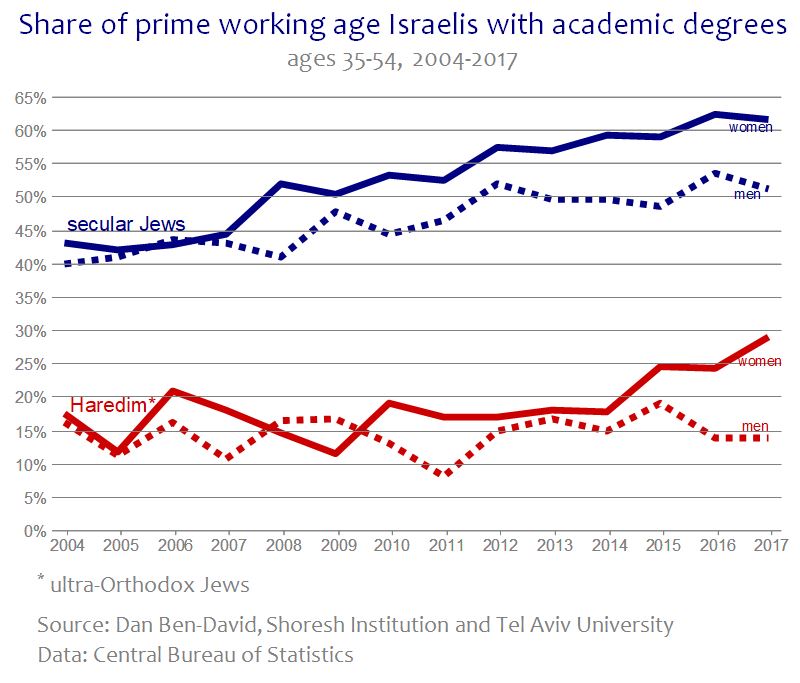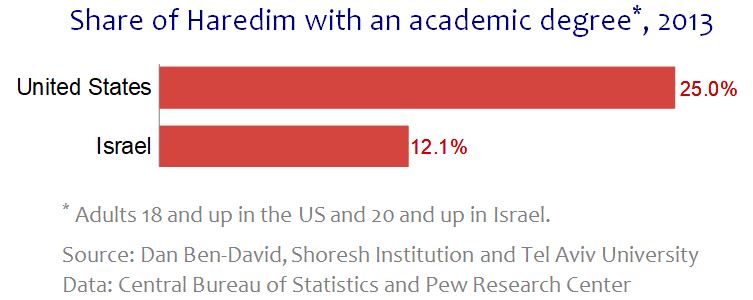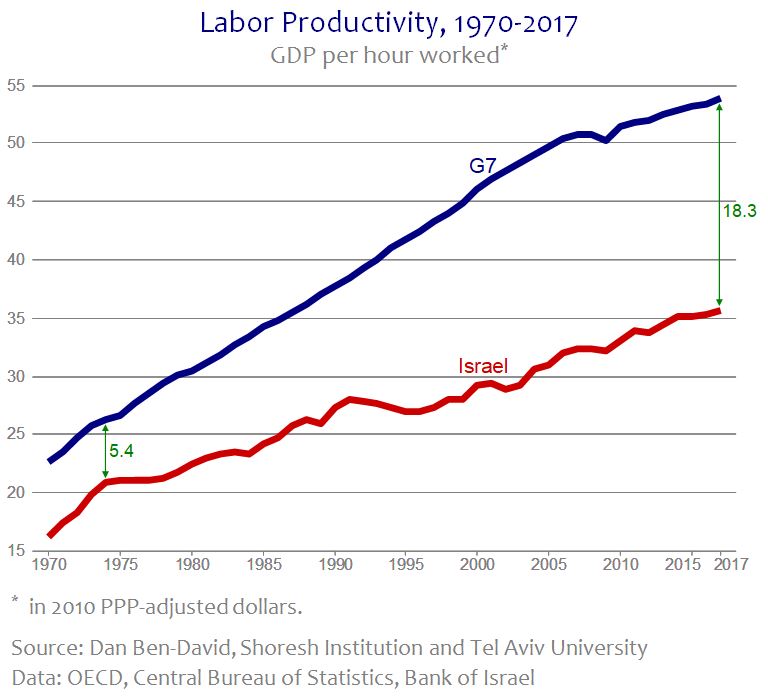Demography, Democracy and Delusions: What’s on the line in Israel’s upcoming elections Dan Ben-David The
prevailing state of mind in Israel is possibly best encapsulated by one of the
most recurrent phrases in the national vocabulary: “everything will be
alright.” It’s the mental bullet-proof
vest that enables us to be one of the happiest nations on earth, according to
UN rankings, despite being located in the planet’s most dangerous region. It’s also the belief that leads a greater
share of Israeli pupils than in any other developed country to claim that they
understand even the most difficult material in mathematics – though their
actual achievements place them at the bottom of the developed world. In other words, for better and for worse,
we’re living in something of a la-la land nurtured by delusions. This
state of mind is a major contributor to the apparent intent of many non-Haredim
to skip the election booth and spend the upcoming election day at home or on
vacation (business and governmental activity unrelated to the elections
officially shuts down on election day).
News flash to these voters: the next few years will not only determine
Israel’s future character but also whether or not the country will even exist
for our grandchildren. Life is not a
computer game. It’s not possible to
click “undo” or “reset” in the future if it turns out that we messed up
today. When those who threaten our very
existence are plowing ahead in their efforts to obtain game-changing weapons,
our national security will continue to require that Israel have a first world
army, and that’s contingent on having a first world economy. Israel’s future ability to maintain a first
world economy is being determined in the country’s schools today. As
it happens, these schools are among the worst in the developed world. The achievements of Arab-Israeli children
(one quarter of the children) in core subjects (math, science and reading) are
below those of many third world countries – and are even below the majority of
predominantly Muslim countries – while most of the Haredim (one fifth of all
Israel’s children) don’t even study the material. These two groups alone account for nearly
half of Israel’s children, and they are further supplemented by the many
children living in the country’s geographic and social peripheries. When roughly half of Israel’s children
receive a third world education – and they belong to the fastest growing
population groups – they will be incapable of maintaining a first world economy
when they become adults, with all that this implies regarding Israel’s future
ability to defend itself. 
The term “natural
partners” needs a makeover With
nothing less than Israel’s physical survival in two generations on the line
today, the time has come to redefine the common political expression, “natural
partners”, often used by Benjamin Netanyahu to describe his governmental
coalitions with the Haredim and right-wing-religious parties. In a country whose future existence is
umbilically tied to the young people who will one-day receive the leadership
mantle, how is it even possible that government after government refuses to
grant an exponentially increasing number of Haredi children the basic right to
a core curriculum – a right that is stipulated by law in every developed
country, except Israel. We
have reached the point that’s already difficult to imagine the creation of a
government requiring a core curriculum.
But laws that are difficult to pass in the Knesset today will become
literally impossible to adopt as Israel’s demography evolves. While Israel’s average fertility rate is high
in relation to every other OECD country, Haredi fertility rates are in the
stratosphere: 7.1 children, in contrast to 4.0 among religious Jews, 3.4 among
Muslim Arab-Israelis and 2.2 among secular Jews. Alongside the Haredim’s political resurgence
in recent years, one that has been accompanied by a boost in benefits, Haredi
fertility rates have once again been climbing (while earlier improvements in
the abysmally low Haredi male employment rates have abated). 
Even
if the number of Haredim who decide to stop being Haredim exceeds the number of
persons deciding to go in the other direction – which may or may not be the
case – the following example should dampen any possible illusions about
potential changes in Israel’s current demographic direction. Suppose that as 20% of the Haredi children
mature, they no longer remain Haredim (clearly an imaginary rate by all
accounts, one that does not even take into account non-Haredim who become
Haredim). That still leaves 5.7 children
in each family who will remain Haredim, a fertility rate that continues to
dwarf all other population groups in Israel.
In other words, the direction that Israel is headed is clear, while only
the rate of demographic change may vary. The
national objective cannot be an attempt at turning Haredim into secular Jews,
and not only because this cannot be a reasonable goal for a society that
regards itself as pluralistic. In any
event, this would not have an impact on the direction that the country is
headed. The emphasis needs to be placed
elsewhere, in a place that is just, that aligns with developed world social
norms, and that is also the only realistic lifeline for a society determined to
survive: education. Irrespective of
whether or not this will have an impact on fertility rates, at least future
generations will have the ability to sustain a first world economy and maintain
the democratic norms of a modern country. There are no
shortcuts in education There
are some who believe that the Haredim finally understand the predicament and
are beginning to change. The flood of
data inundating us makes it difficult to separate the wheat from the chaff, and
whether or not sporadic anecdotal evidence is indeed representative of an
entire society. But even the evidence
that does exist suggests that whatever changes that are occurring are
irrelevant, because they are occurring too late in life. The
fact that there are more Haredim attempting the academic track gives many the
impression that there has been a pivot in the Haredim’s understanding and that
it may nonetheless be possible to skip serious core studies as children. But there are no such short cuts in life. The education that Haredim children receive is
so deficient that three-quarters of the men and half of the women are unable to
complete their chosen academic track (which is itself at an extremely low level
in most of the colleges that they choose to attend). 
While
conventional wisdom – and Haredi politicians – may suggest otherwise, denying
children the education that they need significantly reduces their chances of
overcoming this shortcoming as adults.
Thus, despite the substantial increase in the number of Haredim
embarking on the academic track, the share
of prime working age Haredi men (who do not study any core curriculum
after 8th grade, nor even a full core curriculum before then) with an academic
degree has remained very low and unchanged over the past decade and a half (in
recent years, there has been a slight increase among Haredi women). 
In
the United States, where core curriculums are mandatory for all, Haredim
receive a much better education that enables them to go to college, to choose
professional careers and to remain Haredim.
Consequently, the share of American Haredim with an academic degree is
twice that of Israeli Haredim. 
Israel is the
Start-Up Nation, but … If
there may have been any doubt about the general direction that Israel is headed
– that is, the multi-decade trajectory rather than misleading annual changes
that tend to blur the larger picture – a look at Israel’s labor productivity
path says it all (labor productivity divides the GDP that we collectively
produce by the total number of hours that it took us to produce it). Not only is Israel’s labor productivity among
the lowest in the developed world, the gap between the leading G7 countries
(the U.S., Canada, U.K., Germany, France, Italy and Japan) and Israel has
increased over three-fold over the past forty years. 
Only
a very small portion of Israeli society belongs to the hi-tech, the
universities, and the other parts of the Start-Up Nation. Most of the country’s population is not
receiving either the tools or the conditions to work in a modern society – and
it has been dragging down the entire country since the 1970s. The
implication of Israel’s multi-decade retreat from the leading countries is
reflected in large and increasing gaps between what Israel’s most educated are
able to earn abroad versus their earning possibilities in Israel. Just a very small portion of society has been
responsible for keeping Israel in the first world. If a critical mass from this
group decides to emigrate, the gap between the leading countries and Israel
that has been steadily growing over the past forty years will be blasted to the
heavens with the force of a booster rocket. The
writing is on the wall, and the election next week provides one of our final
opportunities to fix things. It should
be clear that the complexity of the challenges that Israel faces extends far
beyond the issue of Haredim. Pervasive
poverty and income inequality also exists among non-Haredi Jews, not to mention
Arab-Israelis. Not everything begins and
ends with education. The on-going
neglect of other infrastructures has played a major role when successive
governments’ civilian budgets (which had been higher than or similar to the
OECD average during these decades) were diverted toward politically powerful
sectors and interests. In
the final analysis, requiring a core curriculum in Haredi schools is not a
sufficient condition for returning Israel to a sustainable trajectory. However, it is a necessary condition. If a population group this large continues to
exercise considerable influence on the direction and amplitude of flows from
the government faucet in a manner that only further enhances their exponential
growth, while concurrently depriving their children of the vital tools
necessary for integration into a competitive global economy and a modern
society, Israel will cease to exist. Is
it right and is it even possible to mandate the study of a core curriculum by
those who don’t want it? The answer is
“yes” in both cases. Those who believe
that the Haredim have a right to shun modern life, if that is really their
choice, are mistaken on a number of levels.
What Haredim say and how they behave are not the same, which tends to
blur how much they actually want the products of modern life. After all, Haredim do not object to receiving
medical treatment by physicians when they are ill, or to living in a building
planned by an architect, or to an infrastructure planned by an engineer that
delivers water and electricity to their home.
These are just a few of the professions requiring basic and advanced
education at the highest levels. When
their incomes are low, Haredim also do not turn down government aid made
possible by the existence of a modern economy’s welfare system, and they don’t
object to protection by a modern army from enemies that threaten to do here
what prayers did not prevent in the war that began 80 years ago this
month. In short, they do not refuse the
benefits of a modern country. They only
eschew shouldering the burden of responsibilities that make it possible. In
light of the rapid demographic changes that Israel is undergoing, this is no
longer a question of a luxury – i.e. what do the Haredim want – but rather an
issue of what a country needing physicians, architects, engineers, physicists
and all of the other fundamental professions must do to remain in the first
world – and in the case of Israel, in the world at all. Period. As
for the question of whether or not it is even possible to mandate core studies
at this late stage in Israel’s development, the answer is still positive, but
it won’t be easy, and it won’t be possible to do so forever. If such a political decision is made, then
the country can stop all public funding of schools that do not teach a complete
core curriculum and of institutions with a majority of persons who did not
study a full core as children. The
firestorm of protests that will surely ensue can still be contained, though
this will not always be the case in the future, as the demographic changes
accelerate. The
solution lies within the political arena – and here, the picture is somewhat
different than the one commonly highlighted in the public discourse. For example, while 49% of the Arab-Israelis
voted, the number of votes received by the Arab parties was just 32% of the
total number of Arab-Israelis at the age of 18 and up. The implication is that about a third of the
Arab-Israelis who voted chose non-Arab parties.
A completely different picture arises with regard to the Haredim. The number of votes received by the Haredi
parties is identical to the total number of Haredim ages 18 and up. In other words, the Haredi parties have an
additional electoral power source – beyond their already high voting rates –
that emanates from non-Haredi voters. 
When
examining the total number of votes received by all of the other parties, it
turns out that less than half (47%) of
the total votes cast this past April went to right-wing and religious
(non-Haredi) parties while just over a third (35%) went to center-left parties. The bottom line is that, already today,
neither one of the political blocs is able to build a governing coalition on
its own. As the country’s demographics
continue to change, so will the relative weights of the blocs – and the
possibility of passing laws that will save Israel’s future will fade with these
changes. A coalition of real
“natural partners” is needed for changing national priorities Assuming
that Israel has not yet passed the demographic-democratic point of no-return –
an assumption that weakens steadily by the year – one conclusion needs to be
clear. There is still a large majority
of Israelis who are not extremists, a majority for whom the country’s future
existence remains above all other considerations. These are Israeli society’s true “natural
partners.” But they must reach the
ballot boxes, vote, and demand that their representatives begin putting the
direction of the national ship – which today is similar to the course taken by
the Titanic – above all narrow sectoral or personal considerations. A
national unity government, in the full and complete sense of the term, is
urgently needed. It must be a government
that implements significant changes in Israel’s national priorities that will
return the country to a sustainable trajectory while it is still possible to do
so: from instituting a comprehensive, systemic education reform that will turn
Israel’s schools – including in the Haredi sector – into the world’s best, to
transforming the health system into an international beacon and the raising of
the country’s transportation infrastructure into the 21st century. It is all in our hands. To
preserve this national turnaround in priorities and keep Israel on its new and
sustainable trajectories in future decades, it is essential that the next
government also take advantage of the opportunity that extremists are not in
the coalition. The new government needs
to (a) give Israel a constitution, and (b) change the country’s currently
dysfunctional system of government to a system that enables navigation
alongside checks and balances that can withstand the kinds of non-democratic
pressures that have been emerging of late. All
of this brings us to the elephant in the room, Benjamin Netanyahu. There’s no longer any question about the kind
of damage that he is willing to inflict on the pillars of Israel’s democracy –
not to mention on the future of the Zionist dream – just to ensure his personal
objectives. Either he will be permitted
to “bring down the temple,” or the State of Israel needs to reach a decision to
remove him from the political system as quickly as possible so that it can
begin dealing with Israel’s existential challenges. Prime
Minister Yitzhak Rabin (in his first term) and President Ezer Weizmann were
both given the opportunity to avoid criminal charges if they resigned from
office. Hence, these are not
possibilities that are foreign to Israel.
The United States, which needed to put an end to the blood-letting in
Vietnam, preferred to give President Richard Nixon a pardon after he resigned
just to move past that saga and get the country out of the mud. We
have a country that needs saving. To
Israel’s real “natural partners”, go to the voting booths in droves, because we
have no other country but this one.
Afterwards, demand that your representatives begin working together and
build the foundations that will ensure Israel’s future. Let them be heroes not only on the
battlefield (for those who were there) but political heroes that will enter the
history books as the ones who saved the Third Temple. |